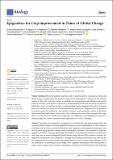Por favor, use este identificador para citar o enlazar a este item:
http://hdl.handle.net/10261/264354COMPARTIR / EXPORTAR:
 SHARE SHARE
 CORE
BASE CORE
BASE
|
|
| Visualizar otros formatos: MARC | Dublin Core | RDF | ORE | MODS | METS | DIDL | DATACITE | |

| Título: | Epigenetics for crop improvement in times of global change |
Autor: | Kakoulidou, Ioanna; Avramidou, Evangelia V.; Baránek, Miroslav; Brunel-Muguet, Sophie; Farrona, Sara CSIC ORCID; Johannes, Frank; Kaiserli, Eirini; Lieberman-Lazarovich, Michal; Martinelli, Federico; Mladenov, Velimir; Testillano, Pilar S. CSIC ORCID ; Vassileva, Valya; Maury, Stéphane | Palabras clave: | Breeding Climate change DNA methylation Epigenomics Memory Plant epigenetics Prediction models Priming |
Fecha de publicación: | 11-ago-2021 | Editor: | Multidisciplinary Digital Publishing Institute | Citación: | Biology 10 (8) 766 (2021) | Resumen: | Epigenetics has emerged as an important research field for crop improvement under the on-going climatic changes. Heritable epigenetic changes can arise independently of DNA sequence alterations and have been associated with altered gene expression and transmitted phenotypic variation. By modulating plant development and physiological responses to environmental conditions, epigenetic diversity—naturally, genetically, chemically, or environmentally induced—can help optimise crop traits in an era challenged by global climate change. Beyond DNA sequence variation, the epigenetic modifications may contribute to breeding by providing useful markers and allowing the use of epigenome diversity to predict plant performance and increase final crop production. Given the difficulties in transferring the knowledge of the epigenetic mechanisms from model plants to crops, various strategies have emerged. Among those strategies are modelling frameworks dedicated to predicting epigenetically controlled-adaptive traits, the use of epigenetics for in vitro regeneration to accelerate crop breeding, and changes of specific epigenetic marks that modulate gene expression of traits of interest. The key challenge that agriculture faces in the 21st century is to increase crop production by speeding up the breeding of resilient crop species. Therefore, epigenetics provides fundamental molecular information with potential direct applications in crop enhancement, tolerance, and adaptation within the context of climate change. | Descripción: | 46 p.-3 fig.-1 tab. | Versión del editor: | https://doi.org/10.3390/biology10080766 | URI: | http://hdl.handle.net/10261/264354 | DOI: | 10.3390/biology10080766 | E-ISSN: | 2079-7737 |
| Aparece en las colecciones: | (CIB) Artículos |
Ficheros en este ítem:
| Fichero | Descripción | Tamaño | Formato | |
|---|---|---|---|---|
| biology_kakoulidou_2021.pdf | Artículo principal | 8,5 MB | Adobe PDF |  Visualizar/Abrir |
CORE Recommender
SCOPUSTM
Citations
53
checked on 04-may-2024
WEB OF SCIENCETM
Citations
47
checked on 18-feb-2024
Page view(s)
53
checked on 06-may-2024
Download(s)
81
checked on 06-may-2024
Google ScholarTM
Check
Altmetric
Altmetric
Este item está licenciado bajo una Licencia Creative Commons



